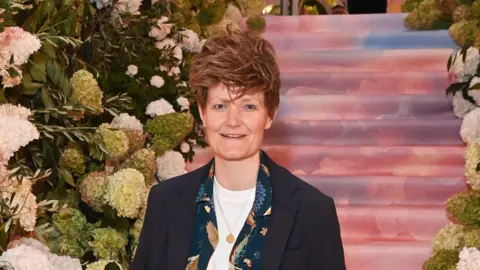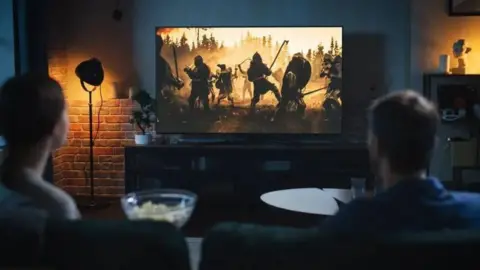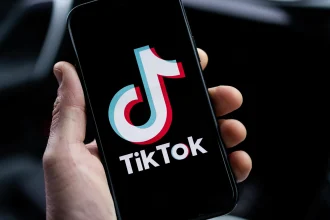Kaos creator Charlie Covell has spoken out in response to Netflix cancelling the popular comedy series this week, just over a month after its release.
The streamer’s decision not to renew the modern-day Greek mythology show, starring Jeff Goldblum as almighty god Zeus, sparked surprise among the show’s fans, as it featured in the platform’s top 10 charts during its first month.
Covell wrote on the Instagram page of the show’s production company, Sister: “Of course I’m gutted not to be making more Kaos, but I don’t want this news to overshadow what we did make…. I’m extremely proud of our show.”
The message also thanked fans for their enduring “love and enthusiasm,” with Covell confirming that one unspecified online fan theory over the series’ cliffhanger ending was “bang on the money.”

Getty Images
Comments beneath their post underscored the strength of feeling from those upset at the cancellation.
The top-rated reply reading: “Please, let’s try with a different streaming service or network.”
Covell previously wrote The End of the F***ing World in collaboration with Channel 4 and Netflix, which reached a natural conclusion after two seasons.
Covell’s statement follows an emotional post from actress Aurora Perrineau, who portrays Eurydice on the show.
Also writing on Instagram, she said “this one hurts” but thanked her fellow cast members, who included Janet McTeer, Billie Piper, Leila Farzad and Stephen Dillane.
“Everyone was brilliant and uniquely themselves. Every performance surprised and excited me,” she wrote. “I can’t believe I got to do this with all of you. We made something weird, dark, hilarious, deranged, and absolutely tragic — something entirely human.”

Getty Images
Netflix’s swift decision to cancel a high-profile, big-budget show like Kaos reflects a shifting strategy across the streaming sector as it evolves.
Streaming service show cancellations are not uncommon and have regularly frustrated subscribers, such as Netflix ending The OA in 2019, and Shadow and Bone in 2023 – after cliffhanger season finales. They both sparked fan-led petitions for their return.
This year alone Disney+ has pulled Star Wars spin-off The Acolyte after one season, alongside Paramount Plus cancelling Halo and Max pulling Tokyo Vice. My Lady Jane was also culled by Amazon Prime.
These recent examples are arguably part of an industry trend.
The past decade has seen rapid growth in streaming platforms backing TV and film projects, drawing a billion subscribers to services by 2020 – growing as Covid lockdowns hit.
This “tech-industry playbook” delivered big programme budgets but less investment in “the basics of programme making,” wrote Stephen Armstrong in The Financial Times last year.
When subscriber numbers temporarily stalled in 2022, streaming giants switched from chasing sign-ups to pursuing profitability.
Brand loyalty?
“Streamers are far more selective with what they commission than where they were five years ago,” TV critic Scott Bryan told the BBC.
“That means those that are really do have to work, and they have to deliver strongly”.
He said that whilst Kaos started strongly, topping UK charts and peaking at number three for English-language shows, the publicly available viewing data suggests interest tapered off.
The Hollywood Reporter described the show’s initial 14.9m views over its first four weeks as “a middling number by the streamer’s standards.”
Streaming services like Netflix remain private about the specifics of their financial and programming decisions. However, Wired previously reported a “viewership-versus-cost-of-renewal review process” in deciding recommissions. Forbes has similarly cited overall series engagement as a key internal metric.
Bryan said the shows that Netflix have recently recommissioned, such as Supercell, Bridgerton and The Gentlemen, point to a focus on “series that can spawn franchises and multiple seasons,” mirroring the shifting industry focus.
“Kaos is a very good show, but it’s also a very expensive show given the cast attached and the special effects – it’s clear it just didn’t match internal expectations for there to be a second season”, says Bryan.
Looking ahead, he feels there is potential reputational danger for individual streamers if popular, word-of-mouth shows keep getting cancelled, potentially making subscribers wary – and weary – of committing to a series only for it to be cancelled.
Analysis from the Wall Street Journal suggests customers already have little brand loyalty, regularly cancelling and renewing different subscriptions.
But for now Netflix’s bottom line, its subscriber base, remains strong, buoyed by international hits including Baby Reindeer and a new ad-supported subscription tier.
The streamer added 8m subscribers in the latest quarter, taking its total subscriber count to over 270m worldwide.
















